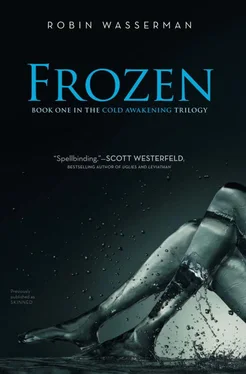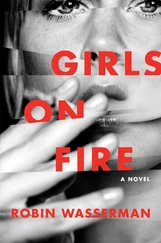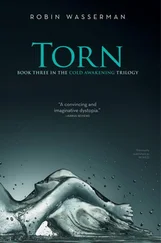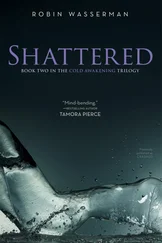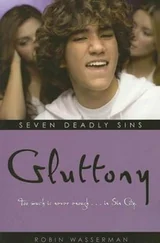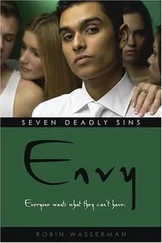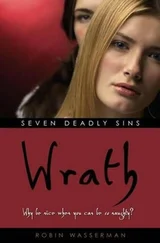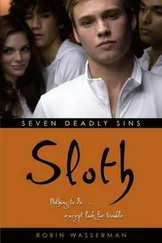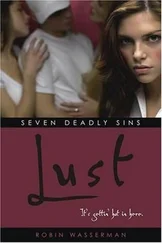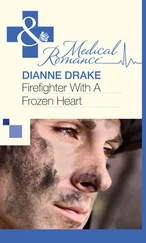I didn’t move.
“Obviously I can’t force you,” he said. “I’m just going to close my eyes and pretend you’re not here. And hopefully when I open them, you won’t be. You want to do something for me? Do that. Help me pretend I still have some fucking control over something .”
He closed his eyes.
I left.
But I didn’t leave the hospital. Because he was right: He didn’t have control over anything anymore. Including me.
I went back to the waiting room. I watched his father return. I watched the doctors and nurses pass through on the way from one crisis to another.
I waited.
I waited until late that night, after his father had fallen asleep and the few remaining doctors and nurses were too busy watching the clock to watch me. And once outside his doorway, I waited again, watching, making sure Auden was asleep.
Then I crept inside. I lifted the chair and placed it at the foot of his bed where, even if he woke up, he wouldn’t be able to see me. He obviously wouldn’t hear me breathing. And he wouldn’t feel my hands resting on the lumpy blanket, cradling his useless feet.
“None of us are volunteers.”
He’s not dead, I told myself, standing outside the hospital, wondering what to do next. That’s what counts. He won’t die, not for a long time—and not because of this.
It should have felt like good news.
He doesn’t want to die, I told myself. He may have said it. But only because he didn’t yet understand that some things are bearable, even when you’re sure that they’re not.
I understand, I told myself. I can help him.
But the second part of that was a lie. And maybe he was right, and the first part was too.
I told myself: This is not your fault.
I told myself the anger would pass, and he would forgive.
Denial bleeds into anger, I told myself. Then would come bargaining and depression, and then, finally, always, acceptance. He would grieve the loss of the life he had wanted. He would accept my help.
I told myself I would find a way to get by without his.
I lied.
It was a cold day. It was always a cold day. And, as always, it didn’t matter to me.
Who was I supposed to go to with this? Auden was the person I went to. Auden was the one who understood. He was supposed to be the solution, not the problem. So who was I supposed to talk to about losing the only person I could talk to? Who was supposed to cure my loneliness if I was alone?
I was alone.
And maybe it was my fault.
Or maybe not, I thought suddenly. Auden would never have been hurt if I hadn’t gone to the waterfall, but I would never have gone to the waterfall if Jude hadn’t shown me the way. If he hadn’t practically dared me to jump, turned it into some huge symbolic statement of my identity instead of what it was: a dumb stunt. Crazy, like Auden had said. Not that I had bothered to listen.
I need to see you, now, I texted Jude, and he sent me an address without asking why. Maybe he just assumed I’d always needed him and was only now realizing it. He was just enough of an ass to think that way.
This is not my fault, I told myself again, and there was more force behind it this time. It’s his.
• • •
It was a different house than before. More of an estate, really; almost a feudal village, complete with outlying buildings dotting the grounds and, atop the highest hill, a turreted Gothic monstrosity that looked like a fairy-tale castle if the fairy tale was Sleeping Beauty , where the princess’s home was decrepit, covered with thorns and forgotten. Jude met me outside.
“You live here ?”
“It’s Quinn’s,” Jude said. “She’s invited some of us to stay… for a while.”
“She barely knows you.”
His lips curled up. “I guess she knows enough.” He guided us down an overgrown path, headed toward a giant greenhouse. There was nothing inside but a thicket of dead plants. Most of the windowpanes were empty; the ground crunched with shattered glass. “So, you come here to chat about real estate?”
“It’s Auden,” I said, suddenly sorry I had come. It felt wrong to say his name out loud, here. To Jude. “He’s hurt.”
Jude nodded. “He’s an org. I hear it happens from time to time.”
I couldn’t believe him. “You don’t even care? You’re not even going to ask how bad?”
“He’s not my friend, as he’s always been so quick to point out. Why should I care?”
“Bad,” I informed him, whether he cared or not. “Thanks to you .”
Jude raised an eyebrow. Nothing touched him. Nothing .
“You pushed me,” I said. “You wouldn’t accept that I wasn’t like you. And you just had to keep pushing and pushing, all that crap about losing control and letting go and I finally did, and he’s the one who has to pay? Congratulations, Jude,” I said bitterly. “It all worked out according to your plan. He hates me, and I’ve got nothing, just like you wanted. Just like you predicted, right? I’m fucking alone. Thanks for your help. Thanks a lot.”
Jude leaned against the door frame of the greenhouse, ignoring the protruding shards of glass. “Deciphering incoherent rants isn’t really a specialty of mine,” he said, still perfectly calm. Detached. “But if I’ve got this right, you did something, your org got hurt, and this is somehow my fault because I told you to do it in the first place? You always do everything you’re told?”
I let myself sink to the ground. It sounded even stupider out loud than it had in my head. The grass was still wet from a morning rain, and the cold water seeped into my filthy, borrowed clothes.
“I hate you,” I said.
“Not much of an apology. But I’ll take it. Want to tell me what happened?”
I told him. All of it, from the fight with Zo straight through to the moment in the hospital room, the sound of Auden’s voice—the tone of Auden’s voice, cold and mechanical—when he told me to leave.
And when I was done, Jude nodded. “Tragic,” he said. As emotionless as ever. I wondered if he’d discovered the secret to shutting down his emotions for good. And if he would teach it to me.
“Feel free to do your little happy dance,” I said. “I know you hated him.”
“I never hated him. I hated the idea of you pretending that he could matter to you or that he could ever understand you. That the two of you were anything but a disaster.”
“Disaster’s right. I was the disaster,” I said. “I ruined his life.”
Jude didn’t say anything. I looked up. “Aren’t you going to tell me it wasn’t my fault? That I shouldn’t blame myself?”
Jude shrugged. “I don’t lie.”
“ He decided to jump in after me. I didn’t force him. I didn’t need saving.”
“ I know,” Jude said. “Because of who I am. He didn’t—because of who he is.”
“Why is it so important to you to believe that we’re different, mechs and orgs?” I said. “Why do you need me to hate them?”
He shook his head slowly. “We don’t hate them, Lia. They hate us.”
Auden didn’t hate me.
At least, he didn’t used to.
“We’re machines,” Jude said. “Unchanging. Perfect—and that perfection is our only flaw. They age, they get sick, injured, always something. They decay . We stay the same. We drift in time; they drown in it. They’ve got a deadline; we don’t. And it’s the one thing they can’t forgive.”
“It doesn’t have to make us inhuman.”
Читать дальше
